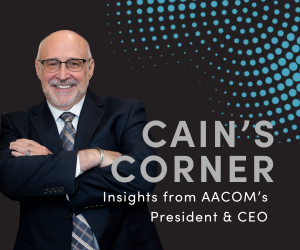The Role of Osteopathic Recognition in Lifelong Learning
Published February 01, 2023
By Robert A. Cain, DO
Cains Corner
So, you’ve completed your DO degree and understand the meaning of lifelong learning. What are your plans for furthering your understanding of osteopathic principles and practice (OPP) throughout your career? Will your lifelong learning include graduate level training that helps you more fully integrate OPP into patient care?
What Does it Take to Fully Integrate the Tenets of Osteopathic Medicine?
Every newly minted osteopathic physician seems to grasp the first tenet of osteopathic medicine reasonably well—mind, body, and spirit must all be addressed when considering the best course of action for a patient: what we call whole-patient care. Beyond this, tenets two and three address structure and function—it is our job to identify and eliminate somatic dysfunction—and the need to support and encourage the body’s intrinsic healing mechanisms to help the patient find health. Tenet four suggests that optimum patient care is based upon the integration of tenets one, two, and three into our decision making.
Fully integrating the second, third, and fourth tenets of osteopathic medicine into patient care likely requires additional development beyond what you learned as a medical student. This shouldn’t come as a surprise—residency is a time to gain more knowledge and develop more skills than medical school allows.
The Unique Opportunity Osteopathic Recognition Offers You
Residency programs with Osteopathic Recognition (OR) offer the potential for you, a newly graduated DO, to align further development of OPP with the specialty you have chosen; in particular, learning more about tenets two, three, and four. Graduates entering residency understand they will learn more about their chosen field, moving from the level of a novice or advanced beginner to the level of competence or proficiency as a physician. Making the same commitment to develop your understanding of OPP to the level of competent or proficient in the specialty assures that your patients receive the kind of care you committed to deliver when you entered an osteopathic medical school.
It only makes sense that your pattern of lifelong learning should then include Continuing Medical Education (CME) that emphasize OPP to assure your patient care continues to be delivered through the lens you learned about in your earliest days of medical school, but we’ll talk more about CME in a future post.
Embracing Care of the Whole Person
Osteopathic medicine seeks to improve our health care system by embracing care of the whole person to help each live well. We rely upon our principles to champion the quality practice of medicine, to balance human need and scientific evidence, to promote a diverse practice community with shared values, and to build a healthier society. The Doctor of Osteopathic Medicine (DO) degree helps the public and others to identify physicians who are trained in this tradition, and prepared to practice and lead with these values in mind.
I’d love to hear your feedback about graduate level training in osteopathic principles and practice. Feel free to share your thoughts about how you learned to integrate OPP into patient care during medical school and how you plan to continue to develop your knowledge and skill in residency.

Robert A. Cain, DO
AACOM President and CEO

